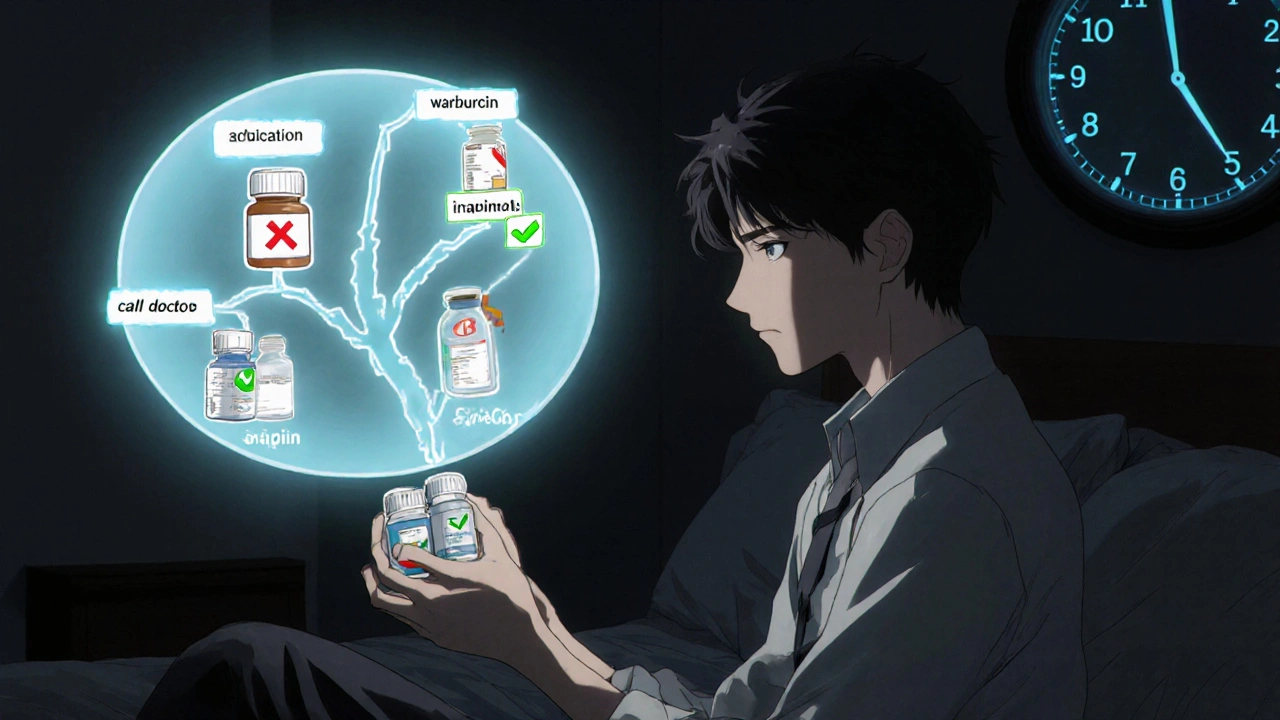
What to Do If You Miss a Dose: A Clear Decision Tree by Medication Type
You forget. It happens. You’re running late, your phone died, or you just spaced out. One pill missing doesn’t feel like a big deal-until you realize it’s your blood thinner, your insulin, or your seizure medicine. That’s when panic sets in. Do you take it now? Double up? Skip it? The answer isn’t the same for every pill. What works for your antidepressant could be dangerous for your heart medication. The truth is, there’s no universal rule. The right move depends on what kind of medication you’re taking.
Most people get vague advice like “take it as soon as you remember.” That’s useless when you’re holding a warfarin tablet or an insulin pen. Real safety comes from knowing the specifics. Based on guidelines from the NHS, FDA, American Heart Association, and the Scottish Patient Safety Programme, here’s exactly what to do by medication type-no guesswork, no doubling down, no risky assumptions.
Anticoagulants: Warfarin vs. DOACs
Missing a dose of a blood thinner is one of the most dangerous mistakes you can make. But the rules for warfarin and newer drugs like apixaban or rivaroxaban are completely different.
If you miss your warfarin and remember before midnight, take it. If it’s already the next day, skip it. Never take two pills to make up for it. Warfarin builds up in your system slowly, and doubling the dose can spike your INR levels, putting you at risk for internal bleeding. UK anticoagulation clinics follow this rule 97% of the time because it’s been proven safe over years of data.
For DOACs like apixaban, dabigatran, or rivaroxaban, you have a 6-hour window. If you remember within 6 hours of your scheduled time, take the missed dose. If it’s been longer than half the dosing interval (e.g., more than 12 hours for a twice-daily pill), skip it. DOACs are cleared from your body faster than warfarin, so catching up after 6 hours won’t help-and it could raise your risk of clotting or bleeding.
Diabetes Medications: Insulin Is Critical
Insulin isn’t like other pills. Missing a dose can send your blood sugar into danger zones fast-either too high (ketoacidosis) or too low (hypoglycemia). The type of insulin changes everything.
Rapid-acting insulin (like Humalog or NovoLog): Take it within 15 minutes of eating. If you miss it after your meal, don’t inject it later. Doing so can cause a dangerous drop in blood sugar hours after eating. Just monitor your glucose and eat carbs if needed.
Long-acting insulin (like Lantus or Levemir): If you miss it by more than 2 hours, don’t take it. These are designed to give you steady background insulin all day. Taking it late can cause overlapping doses and severe hypoglycemia overnight. Call your doctor before adjusting.
For oral diabetes pills, the rules vary. Metformin? You can take it up to 2 hours late with no problem. Sulfonylureas (like glipizide or glyburide)? Skip the missed dose. These drugs force your pancreas to release insulin, and taking them late can cause your blood sugar to crash hours later. The Kentucky Department for Public Health flags these as “RED FLAG” meds-miss more than one, and you need medical help fast.
Cardiovascular Drugs: Timing Matters
Beta-blockers, ACE inhibitors, and diuretics are daily meds, but missing one doesn’t always mean disaster. Still, timing affects safety.
Beta-blockers (like metoprolol): Take the missed dose if you remember within 4 hours of your usual time. After that, skip it. Taking it too close to your next dose can slow your heart rate too much, leading to dizziness or fainting.
ACE inhibitors (like lisinopril): These have a wider safety margin. If you miss it, take it within 12 hours. Beyond that, skip it. No need to panic, but don’t make it a habit.
Diuretics (like furosemide): If you miss your morning dose, you can still take it before 2 p.m. After that, skip it. Taking a diuretic late in the day means you’ll be waking up every hour to pee all night. That’s not just annoying-it disrupts sleep and can raise fall risk, especially in older adults.
Antiarrhythmics (like amiodarone): Never miss a dose. If you do, call your cardiologist immediately. These drugs have a razor-thin safety margin. Missing even one dose can trigger a dangerous heart rhythm rebound.
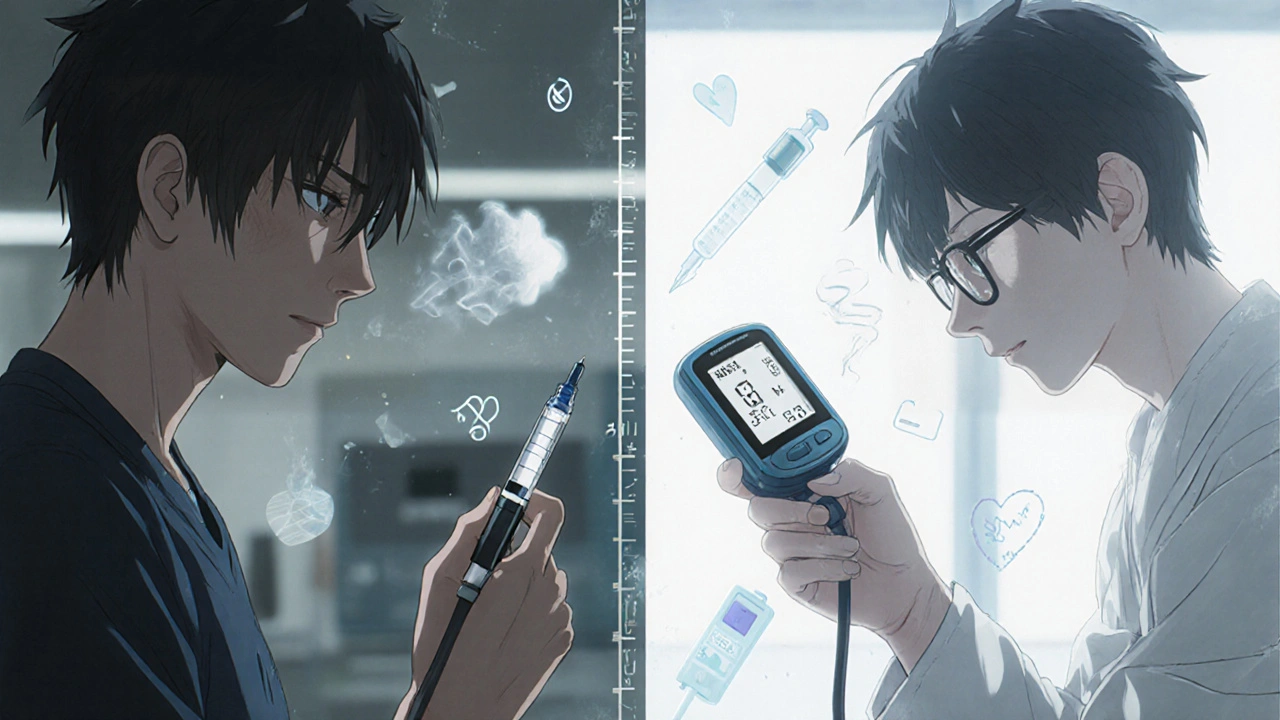
Seizure Medications: One Missed Dose Can Trigger a Seizure
If you take meds for epilepsy or seizures, your brain depends on steady drug levels. A single missed dose can raise your seizure risk by 27-43%, according to the American Epilepsy Society.
Take the missed dose immediately if you remember within half the dosing interval. For a twice-daily pill (e.g., levetiracetam), that’s 12 hours. If it’s been longer than that, skip it. Don’t try to catch up. Taking two pills at once can cause dizziness, confusion, or worse-overdose.
Miss two doses in a row? Call your neurologist. Nearly 92% of U.S. epilepsy centers require immediate follow-up after two missed doses. This isn’t about being perfect-it’s about preventing a life-threatening event.
Immunosuppressants and Cancer Drugs: No Room for Error
If you’ve had a transplant or are on chemotherapy, your body is in a delicate balance. These drugs are powerful-and unforgiving.
Immunosuppressants (like tacrolimus or cyclosporine): Any missed dose, even one, requires an immediate call to your transplant team. Studies show a 4.7-fold increase in acute rejection risk within 30 days of nonadherence. Don’t wait. Don’t guess. Call now.
Cancer chemotherapy: Never adjust your dose on your own. If you miss a chemo session or pill, contact your oncology team right away. These drugs are dosed precisely based on weight, kidney function, and tumor type. Skipping or doubling can be deadly.
Antibiotics: Don’t Stop Early, But Don’t Double Up
Most people stop antibiotics when they feel better. That’s how superbugs are born. But what if you miss a dose?
Time-dependent antibiotics (like penicillin, amoxicillin, cephalexin): Take the missed dose if you remember within 2 hours. If it’s been longer, skip it. These work best when kept at steady levels in your blood. Doubling up won’t help kill the bacteria faster-it just increases side effects like nausea or diarrhea.
Concentration-dependent antibiotics (like gentamicin, vancomycin): These are usually given IV in hospitals, but if you’re on an oral version, missing a dose means your drug level drops too low. Call your provider. You may need a blood test before the next dose.
And please-don’t stop early. The Infectious Diseases Society of America says 63% of patients quit antibiotics too soon, fueling antibiotic resistance. Finish the full course, even if you feel fine.
Hormonal Contraceptives: The One Exception
Here’s the only major exception to the “never double up” rule: birth control pills.
If you miss one active pill (the ones with hormones), take it as soon as you remember-even if that means taking two pills in one day. Then take your next pill at the usual time. Use backup contraception (like condoms) for the next 7 days.
If you miss two or more active pills, the rules get more complex. It depends on what week of the pack you’re in and whether you’re on a 21-day or 28-day pill. The CDC has detailed charts, but the safest move? Call your doctor or pharmacist. Missing multiple pills increases pregnancy risk, and skipping the placebo week can cause breakthrough bleeding.
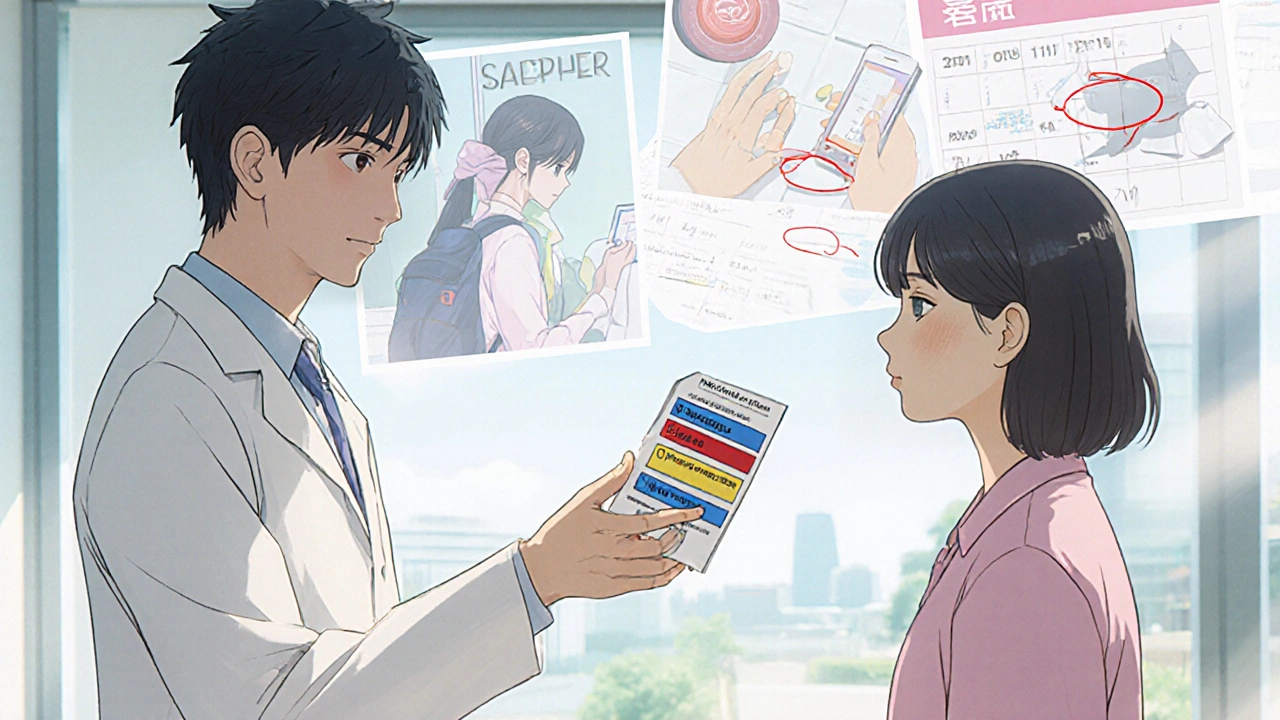
Psychiatric Medications: Subtle Risks
Missing an antidepressant or antipsychotic doesn’t always cause immediate danger-but it can trigger a slow, painful crash.
SSRIs (like sertraline or fluoxetine): Usually safe to skip a missed dose. These take weeks to build up, so one missed pill won’t flip your mood. Just resume your regular schedule.
MAOIs (like phenelzine): If you miss a dose, call your doctor. Restarting after a gap can cause a dangerous spike in blood pressure-hypertensive crisis. This is rare, but deadly.
Antipsychotics (like risperidone or olanzapine): Missing just two doses can cause rebound psychosis, agitation, or hallucinations. The FDA found 38% of patients experience severe symptom return after skipping two doses. If you miss one, take it as soon as you remember. If you miss two, contact your psychiatrist immediately.
The Universal Rule: When in Doubt, Skip It
There’s one rule that applies to nearly every medication: if more than half the dosing interval has passed, skip the missed dose.
For a pill taken twice a day (every 12 hours), that’s 6+ hours. For once-daily, it’s 12+ hours. For three times a day, it’s 4+ hours. This rule comes from the American Pharmacists Association and is used in 94% of U.S. hospitals.
Why? Because doubling doses of narrow-therapeutic-index drugs-like digoxin, levothyroxine, or lithium-is one of the top causes of preventable hospitalizations in older adults. Dr. Jane Smith from the Medication Safety Institute says it accounts for 28% of cases. Your body doesn’t need more medicine-it needs steady levels. Forcing it with a double dose doesn’t help. It hurts.
What to Do Right Now
Don’t wait until you miss a dose to figure this out. Here’s your action plan:
- Write down your meds and their dosing schedule.
- Look up the specific missed-dose rule for each one. Ask your pharmacist. Check the FDA label. Don’t rely on memory.
- Set phone alarms with different tones for each med. Use apps like Medisafe-they’ve been shown to reduce missed doses by 38%.
- Keep a backup dose in your bag, car, or work drawer-especially for insulin, seizure meds, or thyroid pills.
- Never, ever double up unless it’s a birth control pill and you’ve missed only one.
Medication safety isn’t about being perfect. It’s about knowing what to do when you’re not. And now, you do.
What if I miss a dose and don’t remember until the next day?
Skip the missed dose. Don’t take it the next day. Taking it late can disrupt your body’s balance, especially with medications like blood thinners, insulin, or seizure drugs. Resume your regular schedule the following day.
Can I take two pills the next day to make up for it?
Almost never. Doubling doses is dangerous for most medications, especially those with narrow therapeutic windows like warfarin, digoxin, lithium, or thyroid hormones. The only common exception is combined oral contraceptives if you’ve missed one pill. Always check your specific medication’s guidelines.
Why do some meds say “take as soon as you remember” but others don’t?
That vague instruction is often used because manufacturers don’t know how to write precise rules. But real safety comes from knowing the pharmacology. For example, “take as soon as you remember” might be fine for ibuprofen, but deadly for insulin. Always look up the exact timing based on your drug class, not the label alone.
Is it safe to skip a dose if I feel fine?
Feeling fine doesn’t mean your body is fine. Medications like antiepileptics, immunosuppressants, and anticoagulants work behind the scenes. Missing a dose can cause silent changes-rising INR, falling drug levels, or rising blood sugar-long before you notice symptoms. Never skip based on how you feel.
What should I do if I miss multiple doses?
Contact your doctor or pharmacist immediately. Missing two or more doses of insulin, antiepileptics, immunosuppressants, or antipsychotics can lead to serious complications like diabetic ketoacidosis, seizures, organ rejection, or psychosis. Don’t wait to see what happens.
Next Steps: Build Your Safety Plan
Don’t rely on memory. Write it down. Use a pill organizer with time slots. Set alarms on your phone. Keep emergency doses handy. Talk to your pharmacist every time you get a new prescription-they’re trained to give you the exact missed-dose protocol for each drug. And if you’re ever unsure? Call before you take it. Better safe than sorry.
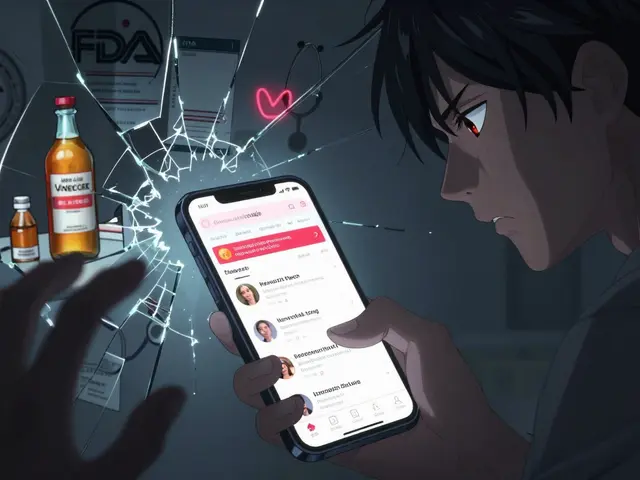

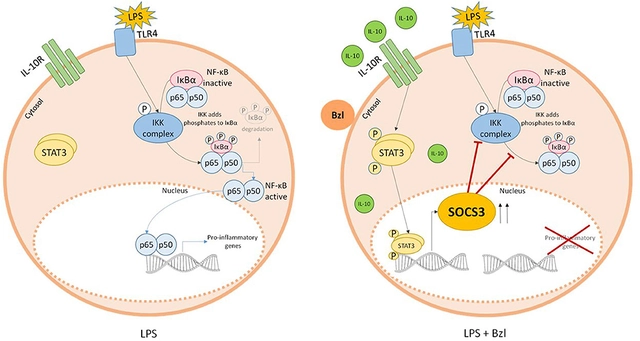
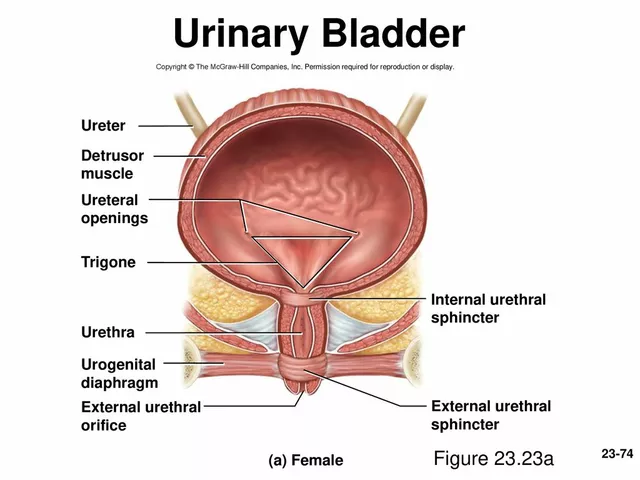

Lisa Detanna
November 19, 2025 AT 12:28Demi-Louise Brown
November 21, 2025 AT 05:49Ross Ruprecht
November 22, 2025 AT 20:34Bryson Carroll
November 24, 2025 AT 19:42Lisa Lee
November 25, 2025 AT 12:37Jennifer Shannon
November 27, 2025 AT 03:26